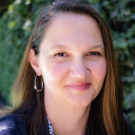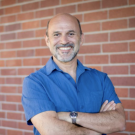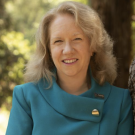Agenda
Friday, December 3
|
8:00am-8:45am |
Pre-Conference Teaching and Learning Complex Preview (limited capacity) |
| 8:45am-9:00am | Check-in |
| 9:00am-9:40am |
Welcome & Plenary (Ballroom A)

Cynthia Carter Ching, Interim Vice Provost and Dean of Undergraduate Education 
Marco Molinaro, Assistant Vice Provost – Educational Effectiveness |
| 9:40am-9:50am |
Break |
| 9:50am-10:50am |
Concurrent Talks Talks (Ballroom A)
Artificial Intelligence for Automating Students’ Learning Assessment Growth Mindset and Critical Hope Frameworks for Assessing On‐Line Course Discussion Boards as A Means of Student Engagement in Self‐Reflection Corrine (Co) Hawes and Tracy Diesslin, Undergraduate Academic Programs, CA&ES Dean's Office Student Use of Google Scholar and Library Search Tools Matthew Conner, Library Talks (Ballroom B)
Concurrent Support for First‐Generation Students in Gateway Classes - When Is Help Most Effective? Joel Ledford, Plant Biology, College of Biological Sciences Using A Course Deficit Model is Most Appropriate for Demographic Grade Gaps David Webb, Department of Physics Input, Output, & Feedback: A Triad Approach to L2 Pronunciation Training in a CALL Environment Lillian Jones, Department of Spanish and Portuguese |
| 10:50am-11:00am | Break |
| 11:00am-noon |
Keynote Speaker (Ballroom A)
The opportunities and challenges of active learning for student anxiety, LGBTQ+ students, and students with disabilities 
Increasingly, college classrooms are transitioning from lecture to active learning. While active learning has been shown to benefit students on average, less is known about how aspects of this learning environment may affect students with marginalized identities. In this talk, I will present some unintended consequences of active learning for student anxiety, LGBTQ+ students, and students with disabilities and how instructors can structure their active learning classrooms to be more inclusive. |
| noon-12:30pm |
Lunch |
| 12:30pm-1:30pm |
Teaching and Learning Complex Preview (limited capacity) or Resource Tables Resource Tables (Ballroom A)
Table 1 | Addressing Global Challenges: A Roundtable Discussion on Integrating the UN Sustainable Development Goals (SDGs) into the Classroom Elizabeth Langridge-Noti, Global Affairs Table 2 | Just-in-Time Teaching Resources and Support Structures Gwen Chodur, Peter Torres, Michelle Rossi, Center for Educational Effectiveness Table 3 | AggieOpen: Supporting an Open Future at UC Davis Sheena Campbell, Library Table 4 | Strategies for course design/Redesign during challenging times Bwalya Lungu, Food, Science and Technology Table 5 | Know Your Students Matthew Steinwachs, Center for Educational Effectiveness Table 6 | Nota Bene Marc T. Facciotti, Genome Center and Biomedical Engineering Table 7 | Student Voices Samantha Munillia Table 8 | Did we, should we, and how should we ask that? Surveys at UC Davis Meryl Motika, Center for Educational Effectiveness |
| 1:30pm-2:00pm |
Poster Session A - odd numbered posters (Ballroom B)
#1 Deadline Flexibility Transparency: A Simple Strategy for Promoting Course Equity and Inclusion Hannah R Stevens, Communication #3 Transition to Emergency Online Teaching: Experiences from Spanish Language Learners and Teachers at UC Davis Ana Ruiz Alonso Bartol, Spanish and Portuguese #5 Investigating Differences in Knowledge Between a Face-to-Face and Online College-Level Nutrition Course Debbie Fetter, Nutrition #7 Documentation for Designers: cultivating media-based reflective practices Tracy Manuel, Design #9 Examining Impacts of Assessments on Grade Equity in Medical School: a School of Education and School of Medicine Collaboration Sattik Ghosh, School of Education #11 Growth Mindset for College Students at UC Davis William Tavernetti, Mathematics #13 Oral Exams: Promoting Learning and Equity Rohit Thomas, Mathematics #15 Inclusion in the Classroom Survey Meryl Motika, Center for Educational Effectivness #17 The Role of Theory in Developing “Informed Knowledge Frameworks” in Graduate Student Instructors Patricia Turner, Center for Educational Effectiveness |
| 2:00pm-2:30pm |
Poster Session B - even numbered posters (Ballroom B)
#2 A Gender-Aware Sentiment Classification Framework to Promote Gender Equity in Educational Content Setareh Rafatirad, Computer Science #4 Addressing engineering students’ need for on-demand computer programming support via a non-course specific tutoring program and Canvas resource page Jason White, Chemical Engineering #6 #8 A Qualitative Investigation of the Interactions of Students with Graduate and Undergraduate TAs in General Chemistry Laboratories Xavier Antoine-Goeas, Chemistry #10 Analyzing Experts’ Chemistry Knowledge Structures Emily Huie, Chemistry #12 Learning Mathematical Language In Large Classes Maria Trnkova, Mathematics #14 Facilitating Discussion in a Culturally Diverse Classroom: Five Practices Yutian Tan, East Asian Languages and Cultures #16 Addressing Epistemic Exclusion in Undergraduate STEM Courses Through Equitable Community Partnerships Prachi Verma, Kavina Desai Global Perspectives Initiative #18 Improving on Critical Thinking and Media Literacy Skills in the Communication Classroom through Assessment Evaluation Jorge Pena, Communication |
| 2:30pm-2:40pm | Break |
| 2:40pm-3:40pm |
Concurrent Talks Talks (Ballroom A)
Efficiently Assessing Group Work in Large Engineering Classes Joël Porquet‐Lupine, Computer Science The Effects of Desirable Difficulties in Learning Chemistry: The Role of Interleaved Practice in Students’ Problem Solving Brandon Vernoy, Department of Chemistry "Flipped Classroom" Models Impact on Knowledge Retention Erik Fausak, Library Talks (Ballroom B)
Cultivating Online Classroom Community through Active Learning: Understanding Student Needs and Instructional Strategies in Times of Crisis Heather J. Hether, Communication Please Help! Does Granting Students’ Exception Requests Create Inequities? Victoria Cross, Psychology Backward Design of A Principles of Microeconomics Course: A Search For A Diverse, Equitable and Inclusive Classroom Janine Wilson, Economics |
| 3:40pm-4:15pm |
Closing & Poster Award Presentation (Ballroom A)

Provost Mary Croughan, Provost and Executive Vice Chancellor 
|